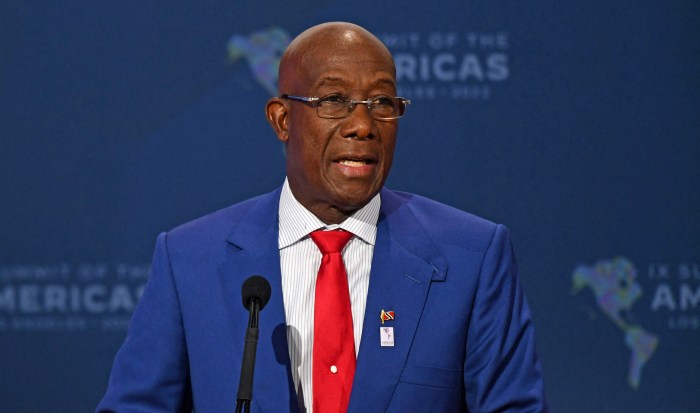A little over a week after authorities in Trinidad announced the closure of an underutilized and money-losing oil refinery, major labor unions have called a general strike for Friday to pressure the administration to reverse its decision but the head of government says he will stick by the decision and is prepared to sacrifice his career for future generations.
Prime Minister Keith Rowley told a party forum this week that government will no longer pour hundreds of millions of dollars into the Petrotrin Oil Refinery in southern Trinidad even as the island’s Chamber of Commerce said in a statement that a general strike would further undermine Trinidad’s already ailing economy.
The move to close a refinery, built to process 140,000 barrels of oil daily but was merely doing 40,000 in recent months, means that close to 2,000 staffers will lose their jobs for now. Authorities argue that oil production had declined so badly in Trinidad that 100,000 barrels had to be imported to keep the facility going but all that would end now as the time had come to face up to realities.
And even as the back and forth involving the cabinet, labor unions and the political opposition continued, several ministers including Anthony Garcia at education have warned workers in other sectors planning sympathy strikes or other forms of industrial action of penalties if they stay away from work Friday.
As the fallout from the announcement continues and as tensions rise, PM Rowley argued that previous administrations were afraid to take such a bold decision for fear of being voted out of office or retired by the electorate but “I am prepared to sacrifice my parliamentary and my political future doing what is right for the children of Trinidad and Tobago. And as for those who are calling for elections, elections will come and you only have one vote. Everybody else has a vote in this country and at that time you citizens will determine whether you elected a government that has the strength of character and the moral fortitude to do what has to be done to give Trinidad and Tobago a better chance.”
Several opposition politicians and others have been urging the cabinet to keep the refinery open and strike a deal with neighboring Guyana to refine its oil when US oil major ExxonMobil and partners begin production in late 2019 or early 2020. Guyana found oil in mid 2015 but no decision has been taken as yet as to whether a refinery would be set up in Guyana or oil where petroleum would be sent for refining.
In the meantime, the local chamber has gone out of its way to urge calm heads on the issue, noting “escalating tensions” in the aftermath of the announcement about the refinery closure.
The body said the general strike call was a “retrograde step that may simply serve to undermine the economy, and ultimately harm the very persons it is intended to help. Instead of calls for disruptive activity, the chamber believes there needs to be a commitment to do whatever it takes to restore our national competitiveness and growth. At a time when our country is grappling with challenging economic conditions, such rhetoric inciting citizens to mobilize can only be described as irresponsible.”
Late last month, Trinidad and Venezuela signed a deal to share production from the massive offshore Dragon gas field through a 10-mile pipeline to a Shell Oil facility in Trinidad from. From there, the gas will be distributed by the National Gas Company. Actual production is expected to begin in 2020.
“TT is an exporter and processor of natural gas and natural gas products. Venezuelan natural gas has never been an input in that business, but after today, we anticipate that in the very near future, Venezuelan natural gas will come to market and be monetized for the benefit of the people of TT and Venezuela,” Rowley said.





















